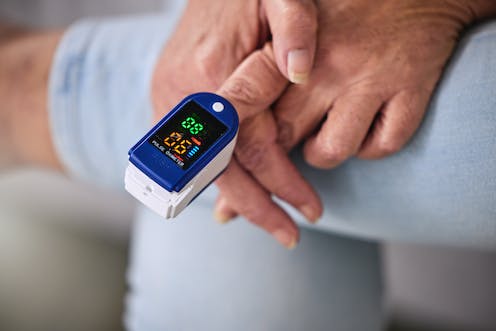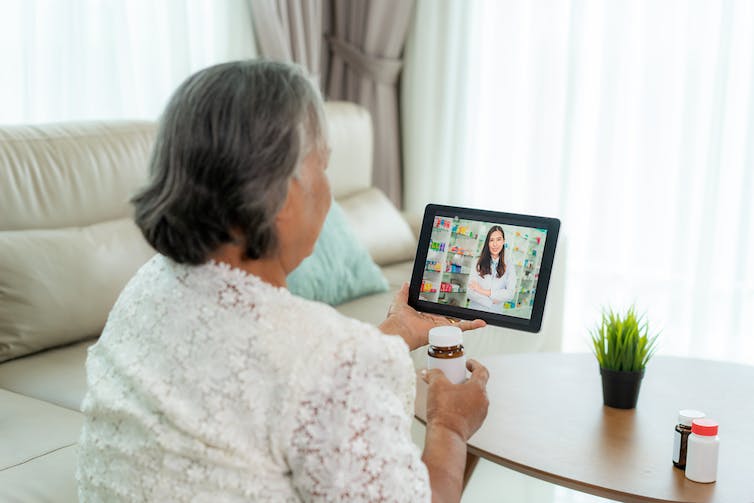
PeopleImages.com – Yuri A/Shutterstock
To tackle ever-increasing hospital waiting times, the government is reforming the way the NHS provides services. One of these reforms is the expansion of virtual wards. The goal is to treat 50,000 people a month in their homes, using remote monitoring technology.
There are definite advantages to managing patients at home rather than in hospital, not least of which is avoiding infection. At the peak of the pandemic, around 20% of all COVID cases were contracted in hospital. And if you are unlucky enough to contract a bacterial infection in a hospital, it is much more likely to be resistant to antibiotics.
There are other advantages, too. Home is usually quieter and more peaceful than noisy hospitals. And being able to keep to normal sleep patterns and mealtimes in familiar surroundings reduces the risk of being disoriented – which can be a problem for older patients.
There is some evidence that older patients in hospitals quickly lose their mobility because they are often confined to bed and staff are often too busy to help them get up and about. At home, there is more opportunity to move around.
Virtual wards have been around for a while, and there is good evidence that it is an effective strategy for some conditions, such as managing serious episodes of chronic obstructive pulmonary disease (a group of lung conditions) by community respiratory teams. These specialist nurses and physiotherapists use a combination of self-monitoring of vital signs and in-person or virtual visits to manage many people who would otherwise have been in hospital.
Intravenous antibiotic therapy for serious infections, such as cellulitis (an infection in the deeper layers of the skin), was previously always undertaken in hospital but can often now be done – at least in part – at home. The patient sends photos to show the degree of resolution of the condition to their doctor.
The approach can also be used to shorten hospital stays, allowing patients who would normally be kept in hospital a few more days to be discharged early. They can still have their vital signs monitored at a distance, for example, after a severe chest infection or flare-up of heart failure. The knowledge that their condition is being monitored is reassuring to patients.
The advent of new technologies, particularly video consulting and inexpensive sensors that are easy to use and link to mobile phones, have greatly helped the introduction of remote monitoring. In future, advanced algorithms may be able to take the place of some of the monitoring that doctors would undertake.

Travelpixs/Shutterstock
Not suitable for everyone
However, not all patients or conditions are suitable for virtual wards. To be successful, there need to be people at home to feed, bathe, medicate and comfort the patient.
Many patients’ partners will be elderly and just about managing to look after themselves. Older people may also have difficulty managing new technologies, particularly if they have a degree of cognitive impairment. As a result, enhanced social services are required to support them.
Given the huge shortfall of people in the UK willing to do this kind of work, finding them will be a challenge to service planners. Additionally, virtual wards are not suitable for severely ill patients, and judging which patients are likely to succeed at home is not easy. It is essential failsafe systems are put in place to allow rapid admission to hospital if the patient’s condition deteriorates.
Virtual wards are also not a cheap option. Although the costs of hospital “hotel” services are avoided, the system requires a similar amount – perhaps even more – of senior doctors’ time to interpret vital signs. To do so at a distance requires experience and skill.
If patients do need to be examined, it will often involve the doctor making a time-consuming visit to the patients. Community services are already extremely stretched in the UK with consultations 10% higher and with fewer full-time GPs in place than before the pandemic. New resources will need to be found if 50,000 more patients are to be cared for in the community. And it isn’t clear where the staff will come from given the current shortages across all clinical specialities.
Virtual wards, implemented carefully can bring great benefits to patients, particularly older patients who generally don’t fare well in hospital. It can free up hospital space, but not necessarily doctors’ time. This last observation is the one that will provide the biggest challenge to the service planners. Where will they find skilled staff to manage these additional services?
![]()
Brian Mckinstry receives funding from Scottish Government Technology Enabled Care to give advice on remote monitoring. He has received multiple grants over the year for investigating the use of technology in medicine particularly in relation to telemonitoring an remote consulting
























